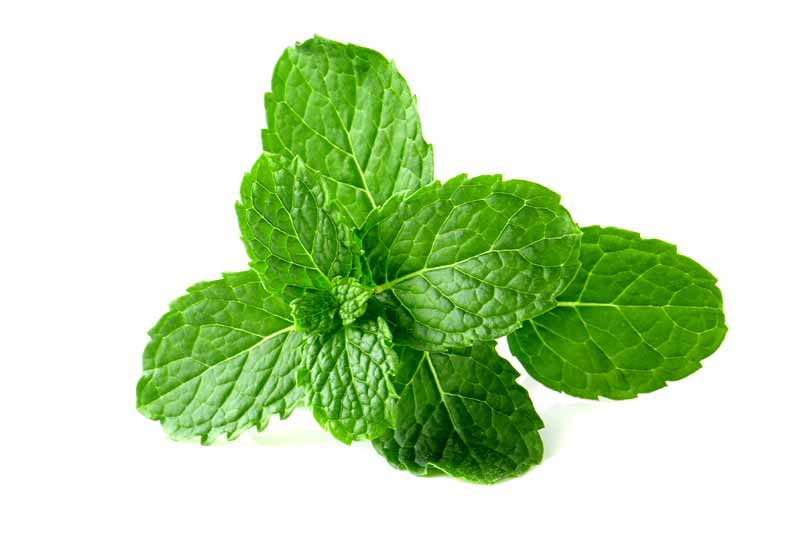Quick Facts
Botanical Name: Mentha Piperata
Family Name: Lamiaceae
Common Name: Peppermint, mentha,× piperita,M. balsamea
Part Used: Leaves
Specific Gravity: 0.900 to 0.912 @ 20°C
Optical Rotation: 16 to -30 @ 20°C
Refractive Index: 1.460 to 1.467 @ 20°C
Blends Well With: lavender,rosemary, ylang-ylang,cypress,lemon geranium, etc
Peppermint is a cross plant between water mint and spearmint which flourishes in Europe and North America and the peppermint oil is derived from this plant. Peppermint oil is popular as flavouring in foods and beverages and as fragrance in soaps and cosmetics. The oil is famous for its different uses for different health conditions. This oil can be taken orally in dietary supplements or topically as a skin cream or ointment. The oil relieves many symptoms of irritable bowel syndrome and indigestion and dietary supplements and skin preparations containing peppermint oil are generally safe for most adults. Excess usage of the oil may cause side effects like heartburn and it may interact with certain medications.
There are many dietary supplements which contain peppermint oil and people use for conditions like nausea, vomiting, morning sickness, cramps of the upper gastrointestinal tract and bile ducts, diarrhoea, bacterial overgrowth of the small intestine, gas, colds, coughs, sinus, inflammation of the mouth and throat, respiratory problems, liver and gallbladder stones. There are skin preparation containing peppermint oil and is used widely for headache, muscle pain, nerve pain, toothache, inflammation of the mouth, joint conditions, allergic rash and also for repelling mosquitoes. Peppermint oil vapour can be inhaled to treat symptoms of colds and cough and peppermint oil can be added to barium solution to relax the colon during barium enemas.
Oldest Medicine
Due to the presence of menthol, menthone and menthyl esters, peppermint and peppermint oil is widely used in manufacturing of soap, shampoo, toothpastes, cigarettes, chewing gum, tea and ice cream. Peppermint is considered to be the oldest medicine in the world and this herb is known for its medicinal uses. Peppermint oil is also sold in the form of capsules and tablets and is prescribed by doctors of alternative and modern medicine. Peppermint oil contains many minerals and nutrients like manganese, iron, magnesium, calcium, folate, copper and potassium. It also contains Vitamin A, Vitamin C and Omega-3-fatty acids.
Peppermint oil has the ability to treat indigestion, respiratory problems, headache, nausea, fever, stomach and bowel spasms and general pain. Peppermint oil has antiseptic properties and is used widely in dental care. It has the capacity to eliminate bad breath and it helps teeth and gums fight off dangerous germs. It is because of these properties peppermint oil is added to many types of toothpaste and is also effective in the treatment of toothaches. Inhaling the peppermint oil vapour acts as anti-inflammatory and pain relieving and it is generally added to postoperative oxygen especially after oral surgeries.
Antifungal Properties
Peppermint oil has antifungal properties and when applied topically it can reduce the chances of fungal nail infection. Peppermint oil provides relief from stress, depression and mental exhaustion because of its refreshing nature. It is effective against anxiety and restlessness and it boost the mental activities, clear the mind and increases focus on cognitive tasks. Peppermint oil is effective for gastroscopy, colonoscopy and during double contrast barium enema where it is applied intraluminally. There are many more benefits of peppermint oil which is why this oil is being used all over the world.
Peppermint oil is ideal to treat urinary tract infections and this is because of its antibacterial qualities. It has the ability to reduce the effects and frequency of urinary tract infections in alternative applications. Menthol which is present abundantly in peppermint oil helps clear the respiratory tract. It is an effective expectorant and therefore provides instant but temporary relief for many respiratory problems like nasal congestion, sinusitis, bronchitis, asthma, common cold and cough. This is also the reason why peppermint is used in many cold rubs and balms.

Stimulating Effects
The cold rubs and balms with peppermint as one of the ingredients remove nasal and respiratory congestion when applied to the chest. Peppermint oil is a natural antispasmodic, expectorant and anti-inflammatory in nature and relieves the trachea inflammation and coughing. Peppermint oil has stimulating effects and it increases blood circulation. Different studies show that the oil vapour when it touches the end of olfactory nerve ending there is instant increase in pulse rate and blood circulation. Increased blood circulation helps to oxygenate the body's organs and increase metabolism and it also oxygenate the brain.
better blood circulation leads to better cognitive function and protection against neutrally degenerative diseases like Alzheimer's and dementia. Increased blood circulation prevents diabetic patients from complications due to the glucose level imbalances.
Peppermint oil is useful for hair care because of the cooling effect it has on the head while removing dandruff and lice. It has antiseptic, regenerative and stimulating effects and it helps in relieving irritation and dry skin on the scalp. It boosts the growth of the hair for those suffering from baldness and provides a shiny and fresh look for the healthy hair. Peppermint oil is found in many hair products because of these reasons and it is also the alternative solutions for baldness, dandruff and other hair related problems. Peppermint oil improves the blood circulation to the head which also promote healthy hair growth.
Creates Cooling Sensation
Peppermint oil contains menthol which is good for the skin because it creates a cooling sensation. It improves the texture of the skin and provides as glow to the skin. This oil nourishes dull skin and is ideal for oily and or greasy skin and also for dry skin. Peppermint oil is used externally to provide relief from pain. The oil has calcium antagonism present in it and this helps remove pain from affected areas. It is used to reduce fever and it can provide an intensely cold sensation to the affected area. Peppermint oil can be applied on the affected areas to reduce swelling, relieve pain and eliminate the chances of uncomfortable inflammation.
Peppermint oil is ideal to enhance the immune system and it increases a person's immunity to various diseases. This oil is ideal for people who suffer from frequent illness of various kinds. Peppermint oil has strong antiviral, antibacterial and antifungal effects and is used in many alternative treatments. Peppermint oil is composed of camphor, menthol and carvacrol and is resistant to dangerous bacterial strains like E.coli, salmonella and staph infections





